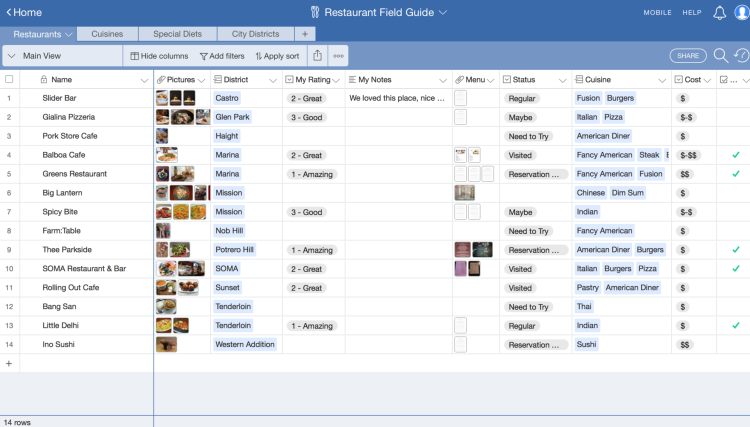Continuing my ebook library management with Python
Yesterday, I developed a Python function to extract data from the Calibre ebook manager.
Today I wanted to extend this to extracting similar data from Airtable.
Airtable
Airtable is an online database/spreadsheet tool that allows me to save and manage data online. The basic interface is very much like an online spreadsheet, such as the Google Sheets component of Google Docs.
 Image by Kvysyar from Wikipedia
Image by Kvysyar from Wikipedia
Airtable's power comes from its API, which provides remote access to the data, giving me the ability to search, edit and update the data from a Python script.
I had actually played with Airtable previously, and started to create a database (called a "base" by Airtable) to store a list of my ebooks, by directly typing in the ebook details on screen. Rather than trying to manually complete this database, I decided to use the power of Python!
Using Python with Airtable
Airtable has a simple Python API wrapper which I used to access my data.
Two key IDs I needed were my Personal API Key, which is unique to me and is required to access my data via the API, and the Database ID, which uniquely identifies my database.
The Personal API Key is visible by going to to my Account Overview on the Airtable website. The Database ID is visible by opening the base on the Airtable website, and then clicking on Help and API Documentation.
Both of these are unique to me, and I saved them in a separate Python module
which i called ebooksconf.py.
AIRTABLE_API_KEY = "********"
EBOOKS_DATABASE_ID = "********"
Writing the code
I first needed to install the Airtable wrapper library:
pip install airtable-python-wrapper
Then in my Python script, I imported the library:
import airtable
I next wrote a function get_airtable_books() to read my ebooks and authors.
I have two separate tables Books and Authors in my ebooks database, so
I read both of them.
def get_airtable_books():
"""Get the list of books and authors from my AirTable ebooks database."""
my_books = airtable.Airtable(
ebooksconf.EBOOKS_DATABASE_ID,
"Books",
api_key=ebooksconf.AIRTABLE_API_KEY,
)
my_authors = airtable.Airtable(
ebooksconf.EBOOKS_DATABASE_ID,
"Authors",
api_key=ebooksconf.AIRTABLE_API_KEY,
)
Airtable returns its data with a unique ID key for each record. I wanted to compare this data with other sources, such as my Calibre library, so the Airtable key is not relevant for my needs. I took a similar approach to the way I dealt with Calibre data yesterday, creating a new Python dictionary, keyed off the book title rather than the record ID.
I read in a number of different fields into the dictionary, including the Purchase Date and the original Source (mostly Amazon, but I also bought some of my ebooks from OReilly.com, humblebundle.com and other sources).
Note: the loop below took some time to to through each of my Airtable
records. I added the tqdm progress bar to visually show activity. Otherwise
not much seemed to happen for a minute or more. I had this already installed
tqdm on my system (pip install tqdm) and imported (import tqdm) at the
start of my script. I probably should optimize this loop at some future stage
so that the progress bar is not required.
books = {}
# Iterate through the table and generate a list of file names
print("Getting AirTable data")
for book in tqdm.tqdm(my_books.get_all()):
title = book["fields"]["Title"]
books[title] = {}
books[title]["id"] = book["id"]
books[title]["Purchase Date"] = book["fields"]["Purchase Date"]
books[title]["Source"] = book["fields"]["Source"]
# The Authors field contains a list of zero or more links to records in
# the separate Authors table.
author_ids = book["fields"]["Authors"]
authors = []
for author_id in author_ids:
# Open each linked Author record, and get the author's name
author = my_authors.get(author_id)
author_name = author["fields"]["Name"]
authors.append(author_name)
books[title]["Authors"] = authors
print("Got {} books from Airtable".format(len(books)))
return books
I can now call this function and display the results with pprint.
if __name__ == "__main__":
airtable_books = get_airtable_books()
pprint.pprint(airtable_books)
Conclusion
Combining yesterday's and today's work, I now have two functions which get data from Calibre and Airtable, and restructures that data into two similar Python dictionaries.
Today's work taught me about the Airtable API, and how to get data from a remote cloud source.
The full source code for today's work is in my Github repository here:
https://github.com/simulatine/100DaysOfCode/blob/master/eBooks/ebooks.py
